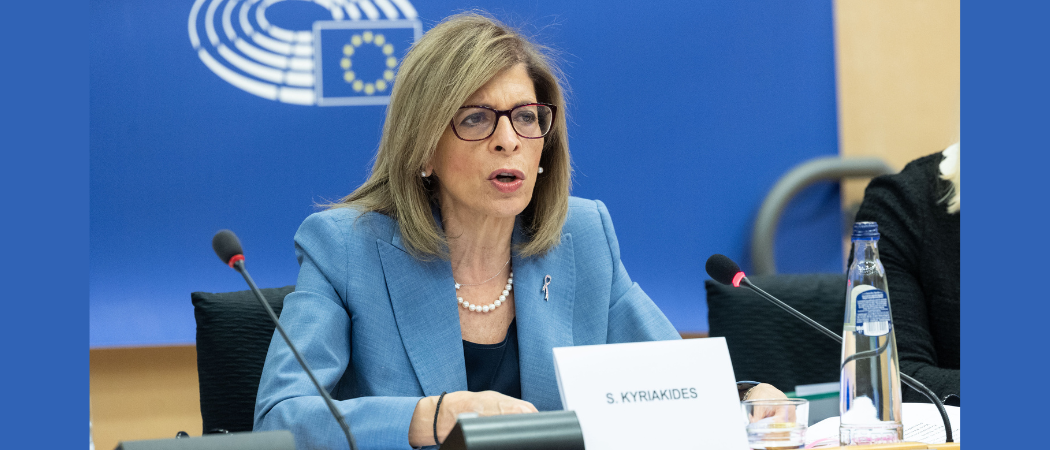Already overdue, the new pharmaceutical strategy will not be published tomorrow as promised. The Commission says the proposal will arrive ‘slightly later’, as tensions fly high over how to incentivise industrial R&D

Stella Kyriakides, EU health commissioner, speaking at a parliamentary committee meeting this week. Photo: Alexis Haulot / European Union
EU’s upcoming pharmaceutical strategy remains under wraps, after the Commission once again delayed its publication this week.
Stella Kyriakides, EU’s health commissioner, answering questions at the European Parliament’s COVID-19 committee on Tuesday, assured the MEPs the proposal is on its way, whilst acknowledging missing two deadlines in December and tomorrow, 29 March.
“This is an extremely complicated package. It’s sorting after over 20 years [how] to change the way we look at the pharmaceutical legislation in terms of shortages, in terms of access, in terms of affordability,” said Kyriakides. “We’re trying to get these balances right to serve patients and all citizens in the EU, but also to support innovation. This is why there was a delay and it won’t be presented on Wednesday.”
The frustration over delays is high as Brussels awaits the legislation. Sara Cerdas, MEP in the Parliament’s S&D group, called out the Commission suggesting the delays may be hindering Europe’s capacity to address emerging health threats.
The current Parliament’s term ends next year and MEPs want to have their say on the file before a new set of policymakers takes the reigns. “This is something this Parliament truly wants to see. Even though there have been some leaks, we want to see the legislation coming,” Cerdas told Kyriakides.
Kyriakides assured MEPs the file will be discussed with the current Parliament. “I look forward to putting it forward and being back here to discuss it and support it with you,” she said.
The proposal for legislation is two years in the making. The Commission first presented its pharmaceutical strategy aimed at increasing drug discovery and development in Europe as well as ensuring access and availability to medicines in November 2020. Since then, it’s been working on translating the proposals into legislation, as an update to the Human Medicines Directive and Regulation.
A fight over money
As the stalemate drags on, tensions are high over what the new legislation will entail – and how much the new rules may cost or benefit industry. In October, a group of members of the European Parliament signed a letter calling on the Commission to give pharma companies bigger incentives to invest in R&D. But others disagreed, saying bigger profits are likely to go to shareholders rather than research.
Draft proposals have been leaked twice. Once in November, once in February, on both occasions a month ahead the expected publication date. Industry hasn’t been happy.
Responding to the February leak, the industry group EFPIA said the draft proposal “would send Europe to the back of the queue for healthcare treatments, clinical research, jobs and global investment.”
Nathalie Moll, EFPIA director general, said companies already face difficulties researching and developing medicines and vaccines in Europe and many intend to take their research elsewhere. These are not “knee-jerk reactions” but reflect discontent with the current framework.
“If we want to retain our role in medical innovation it can only be achieved through a future-proof, innovation-minded regulatory framework, and a world-class, robust and predictable intellectual property ecosystem,” said Moll.
MEPs are not happy with the leaked draft rules either. In a statement today from Parliament’s centre-right EPP group, Peter Liese MEP says the draft is “not good enough” and that “real breakthrough innovations must be rewarded better than now.”
This has been a rolling issue from the start. Last September, Politico reported the draft legislation was sent back for revision amid concerns that the new fairer rules would cost the EU’s drug industry too much.
The Commission spokesman could not specify a new date for the release of the strategy. He said, taking into account commissioners’ busy agendas, “the adoption of the pharma revision will take place slightly later than the date which was indicated in the tentative agenda,” adding, “for timing, we invite you to keep an eye on the next College agenda.”





 A unique international forum for public research organisations and companies to connect their external engagement with strategic interests around their R&D system.
A unique international forum for public research organisations and companies to connect their external engagement with strategic interests around their R&D system.